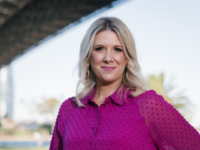Seven years ago Jordana Edwards and her mum, a naturopath, created three teas to start a small market stall in Byron Bay. Today their business, Clean Tea, sells over 50 blends of handmade tea and has grown into a multi-million dollar brand. We spoke to Jordana about the journey the family business has taken.
ISB: What inspired you to get into the tea-making business?
JE: Eight years ago in our regional area there wasn’t a lot of work available and I was inspired by local woman creating their own businesses. Being a tea lover, and wanting a low-tox tea option, I set out to create a tea brand that without pesticides or unnecessary added flavours, just natural and delicious herbs and fruits.
ISB: And how did you and your mum go about developing the business from one based at a single market stall into a million-dollar plus brand?
JE: It was a moment at the Byron Bay markets when a huge storm ripped the roof of my tent and I was hiding under my trestle table with all the tea, and my phone was giving me notifications that my online store was getting sales. I saw it as a sign to turn all my attention on creating an eCommerce brand, and my days at the markets were done. After attending a lot of networking events and learning from other successful businesswomen, I realised we had a great product but lacked a strong brand identity. We rebranded in 2015 and created our first ” sample box” concept. I had attended a few local facebook classes and decided to give it a try, and one $20 boosted-post returned a 2000 per cent increase in sales overnight. We have doubled our turnover every year using predominantly Facebook ads –they have given us over $2.6 million in sales.
ISB: What was the biggest challenge you faced in getting the enterprise off the ground?
JE: We were entering a very crowded market, there were already thousands of tea brands across Australia, and we initially struggled to find our own brand identity and unique selling proposition. Rebranding and creating our own range of sample boxes help to cement the brand. We use targeted Facebook ads to attract the customers that are most likely to enjoy our product. Traditional media hopes that customers are searching for you and will find your ads, whereas Facebook ads target the customers who may not know about you but are in need of your product or service, showing your brand to audiences who may never have found you otherwise.
ISB: How has being part of Facebook’s Small Business Council helped in the growth of your business?
JE: It has given me an insight into how their products work to deliver the best possible outcome for your investment. I have been lucky to receive some great training, which I have passed onto the women in business I mentor in my local Women In Business group. Hearing the real-life stories of other small-business owners, and being able to learn from them, has been a great asset to our business.
ISB: Please tell us about the ethos behind the new brand you launched in April.
JE: After the birth of my third child, who suffered from terrible colic, we created our Colic Tea to help relieve her symptoms. It quickly came to be known by some mums as a “miracle tea” and at one point represented 70 per cent of our sales. Realising the incredible need for breastfeeding tea solutions among mums suffering with colic babies or lactation supply, we decided to separate those breastfeeding teas and create a new brand – The Breastfeeding Tea Co – with the sole purpose of helping breastfeeding mothers. We planned the launch in April, with COVID shutdowns occuring in March it was certainly a challenging time but we forged ahead. Having a baby can be hard enough, but doing so during a pandemic when cut off from your support network of friends and family can be very isolating. We are so proud we were able to launch in April and so far have been able to assist thousands of mothers through their breastfeeding journey.
ISB: And, Finally, what is the number one lesson you’ve learnt on your business journey you’d share with others looking to start their own enterprise?
JE: You don’t have to know how to do it all right away. I wasted a lot of time and money trying to wear every hat in the business, once I realised I could pay people who could do it better for me, I was able to spend my time focusing on my best skills and growing the brand.
















